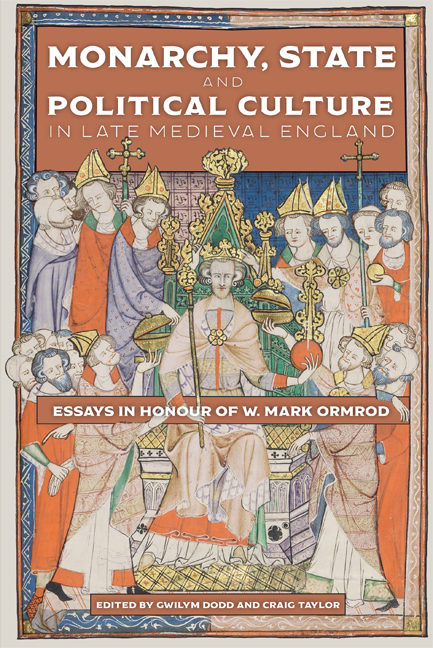Book contents
- Frontmatter
- Contents
- Frontispiece
- Preface and Acknowledgements
- Contributors
- Abbreviations
- Professor W. Mark Ormrod: A Personal Appreciation
- 1 The ‘Unfortunate’ Fraudster: Thomas de Boulton and the East Riding Lay Subsidy of 1332
- 2 Negotiating and Creating Collegiate Statutes in the Fourteenth Century
- 3 An Emotional Pragmatism: Edward III and Death
- 4 Defaming the King: Reporting Disloyal Speech in Fourteenth-Century England
- 5 Law and Arms: The Politics of Chivalry in Late Medieval England
- 6 ‘Nother by Addicions, Nother by Diminucions’: The Parliament of April 1414 and the Drafting of Late Medieval English Legislation
- 7 The Medieval ‘Side-Hustler’: Thomas Hoccleve’s Career in, and out of, the Privy Seal
- 8 The Order, Rules and Constructions of the House of the Most Excellent Princess Cecily, Duchess of York
- 9 Archbishops’ Registers Revealed: Church, State and Society in the Registers of the Archbishops of York, 1225–c.1650
- List of PhD Supervisees
- List of Grants
- Index
- Tabula Gratulatoria
7 - The Medieval ‘Side-Hustler’: Thomas Hoccleve’s Career in, and out of, the Privy Seal
Published online by Cambridge University Press: 06 October 2020
- Frontmatter
- Contents
- Frontispiece
- Preface and Acknowledgements
- Contributors
- Abbreviations
- Professor W. Mark Ormrod: A Personal Appreciation
- 1 The ‘Unfortunate’ Fraudster: Thomas de Boulton and the East Riding Lay Subsidy of 1332
- 2 Negotiating and Creating Collegiate Statutes in the Fourteenth Century
- 3 An Emotional Pragmatism: Edward III and Death
- 4 Defaming the King: Reporting Disloyal Speech in Fourteenth-Century England
- 5 Law and Arms: The Politics of Chivalry in Late Medieval England
- 6 ‘Nother by Addicions, Nother by Diminucions’: The Parliament of April 1414 and the Drafting of Late Medieval English Legislation
- 7 The Medieval ‘Side-Hustler’: Thomas Hoccleve’s Career in, and out of, the Privy Seal
- 8 The Order, Rules and Constructions of the House of the Most Excellent Princess Cecily, Duchess of York
- 9 Archbishops’ Registers Revealed: Church, State and Society in the Registers of the Archbishops of York, 1225–c.1650
- List of PhD Supervisees
- List of Grants
- Index
- Tabula Gratulatoria
Summary
IN A 2012 ARTICLE, ANDREW PRESCOTT bemoaned ‘the failure [of scholars] to consider such administrative documents as pipe rolls, petitions, charters or even tallies as scribal products, whose codicology (if this is the appropriate word here) and script are just as worthy of close investigation and analysis as such celebrated scribal achievements as the Ellesmere manuscript of the Canterbury Tales or the Luttrell Psalter.’ Since the publication of this article, there have been further advances in this area of scholarship. It remains the case, however, that there have been relatively few studies of medieval administrative documents with an explicit focus on their scribal production. The discussion in this chapter makes a contribution to this subject through a close study of the career of a single clerk, Thomas Hoccleve. Hoccleve is uniquely suited to such a study since, through his poetry, we have access to an unprecedented level of autobiographical detail; this has made him one of the key sources for those who have studied the daily life of the late medieval clerk. In addition, others have attempted to piece together the chronology of Hoccleve's life using the various grants and payments made to him out of the exchequer, which were recorded in the issue rolls. However, there has been surprisingly little scholarship focussing on the documents produced by Hoccleve during the course of his career at the privy seal. In an important study, Linne Mooney identified a number of documents sent from the privy seal to the exchequer in Hoccleve's hand. This work revealed many new insights into Hoccleve's life and the possible motives behind the composition of his poetry; however, there is a substantial number of documents written by him that were not considered in Mooney's analysis.
The present discussion presents a more rounded picture of Hoccleve's career as a clerk through examination of documents sent from the privy seal not only to the exchequer (the focus of Mooney's analysis), but also to the chancery. This brings to the fore a total of over 900 new documents which have been identified in Hoccleve's hand.
- Type
- Chapter
- Information
- Monarchy, State and Political Culture in Late Medieval EnglandEssays in Honour of W. Mark Ormrod, pp. 144 - 163Publisher: Boydell & BrewerPrint publication year: 2020



